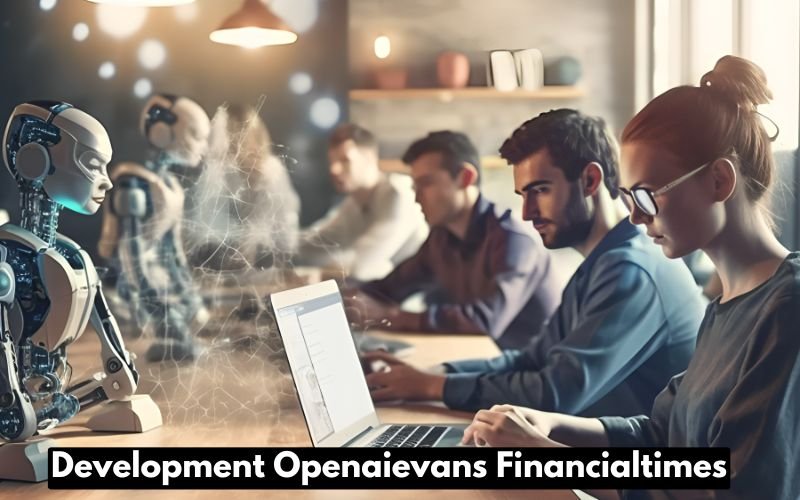The rise of artificial intelligence (AI) has been nothing short of transformative. At the heart of this revolution stands OpenAI, a leading research organization shaping the future of AI development. The journey of OpenAI has not only captivated the attention of experts but also piqued the interest of renowned publications like the Financial Times. Amid this narrative, insights from industry veterans like Evans add depth to understanding the implications of OpenAI’s advancements.
In this article, we’ll take a detailed look at the development of OpenAI, highlight Evans’s contributions and perspectives, and explore how the Financial Times has covered these developments. These threads weave a story of innovation, ethics, and the ever-evolving relationship between technology and society.
What is OpenAI?
OpenAI is a cutting-edge artificial intelligence research organization with a mission to ensure that AI benefits all of humanity. Founded in December 2015 by a group of visionary thinkers, including Elon Musk and Sam Altman, OpenAI began as a nonprofit initiative to counterbalance the risks of unchecked AI development.
Over the years, OpenAI has grown exponentially, transitioning into a capped-profit company in 2019. This hybrid structure allows it to attract significant funding while adhering to its original mission. Some of OpenAI’s most notable projects include:
- GPT Models: Generative Pre-trained Transformers, the foundation of ChatGPT.
- DALL-E: AI-powered image generation from Text prompts.
- Codex: An AI model capable of writing code.
- OpenAI API: Tools allowing developers to integrate AI into various applications.
The development of OpenAI demonstrates its commitment to solving complex challenges and making AI accessible to researchers, developers, and end users.
The Development of OpenAI: A Timeline of Milestones
OpenAI’s groundbreaking achievements and pivotal decisions mark OpenAI’s journey. Let’s walk through some of the critical moments in its development:
- Founding and Early Vision (2015-2016)
OpenAI started with a pledge to keep AI research open and collaborative. This early vision aimed to foster global cooperation rather than competition. The organization’s first research papers focused on reinforcement learning, a key area in AI development.
- The Release of GPT Models (2018-Present)
In 2018, OpenAI introduced GPT, its first language model capable of generating coherent and contextually accurate Text. This innovation set the stage for later iterations, including GPT-2, GPT-3, and GPT-4. The leap from GPT-3 to GPT-4 was particularly striking, with advancements in reasoning, creativity, and understanding complex prompts.
- Ethical Challenges and Transparency (2019)
In 2019, OpenAI published GPT-2 but held back its full release due to concerns about misuse. This sparked debates about balancing innovation with responsibility—an issue that continues to be central to the development of OpenAI.
- Commercialization and Partnerships (2020-Present)
With the launch of the OpenAI API and its partnership with Microsoft, OpenAI began commercializing its technologies. Microsoft integrated OpenAI’s models into its Azure cloud services, making AI tools more accessible to businesses worldwide.
The development of OpenAI underscores the importance of innovation grounded in ethical principles. Each milestone reflects its focus on pushing boundaries while navigating complex societal challenges.
The Role of Evans in Shaping AI Discussions
When discussing the development of OpenAI, it’s impossible to ignore the contributions of thought leaders like Evans. Known for his expertise in AI ethics and technology policy, Evans has played a crucial role in analyzing the societal implications of AI advancements.
Evans’ Contributions to AI Ethics
- Advocates for responsible AI governance to prevent misuse.
- Emphasizes the importance of transparency in AI development.
- Highlights the need for collaboration between governments, organizations, and researchers.
Evans’ Insights on OpenAI
Evans has often praised OpenAI’s efforts to balance innovation with ethical responsibility. However, he has also urged the organization to continue prioritizing diversity in AI datasets to reduce biases and ensure fairness.
Through his critical yet optimistic lens, Evans encourages both industry leaders and policymakers to embrace AI as a tool for global good while addressing its challenges head-on.
Financial Times’ Coverage of OpenAI
Financial Times has long been a trusted source for business and technology news. Its coverage of OpenAI’s development has been comprehensive, highlighting its achievements, controversies, and economic impact.
Critical Themes in Financial Times’ Reporting
- AI’s Economic Potential
- Financial Times frequently explores how OpenAI’s innovations are reshaping industries. From automating tasks to enhancing customer experiences, the publication has underscored AI’s potential to boost productivity and generate economic growth.
- Ethical Concerns
- The newspaper has also reported on the ethical dilemmas posed by AI technologies, often referencing OpenAI’s cautious approach to releasing its most powerful models.
- Partnerships and Investments
- The collaboration between OpenAI and Microsoft has been a recurring topic in the Financial Times, with articles delving into how this partnership drives AI adoption at scale.
The detailed analysis provided by the Financial Times enriches public understanding of OpenAI’s impact, presenting a balanced view of its promise and challenges.
How OpenAI is Changing the World
The development of OpenAI is not just about technology—it’s about transformation. Its innovations, from education to healthcare, make a tangible difference in people’s lives.
Key Areas of Impact
- Education
- AI-powered tools like ChatGPT are helping students learn more effectively by providing instant answers and personalized feedback.
- Teachers can use AI to create lesson plans, grade assignments, and track student progress.
- Healthcare
- OpenAI models assist doctors in diagnosing conditions by analyzing patient data and medical research.
- AI-driven chatbots are improving mental health care by supporting individuals in crisis.
- Business and Productivity
- Companies use OpenAI tools to automate repetitive tasks, allowing employees to focus on strategic goals.
- AI is revolutionizing customer service through more natural and intuitive interactions.
Through these applications, OpenAI’s development is proving to be a catalyst for progress across multiple domains.
Challenges in AI Development
While the development of OpenAI is a beacon of innovation, it’s not without its hurdles. Some of the most pressing challenges include:
- Bias in AI Models: Ensuring datasets are diverse enough to minimize biases.
- Misuse of AI: Preventing malicious actors from exploiting AI tools for harm.
- Transparency: Striking the right balance between protecting proprietary technologies and maintaining public trust.
Tackling these challenges requires collaboration between researchers, policymakers, and society.
OpenAI’s Future: What Lies Ahead?
The development of OpenAI is far from over. As the organization continues to innovate, its focus remains on creating AI systems that are not only powerful but also aligned with human values.
Exciting Prospects
- AI Assistants: Smarter virtual assistants capable of handling complex tasks.
- Scientific Research: Using AI to accelerate discoveries in climate change and medicine.
- Global Collaboration: Expanding partnerships to bring AI benefits to underserved communities.
OpenAI’s future is brimming with possibilities, and its continued success will depend on its ability to navigate technical and ethical challenges.
Table: OpenAI’s Key Contributions and Impacts
ContributionImpact
GPT Models Revolutionizing Natural Language Processing.
DALL-E Transforming creativity through AI-generated art.
Codex is Making coding more accessible to developers.
OpenAI API enables businesses to integrate AI easily.
This table provides a snapshot of how OpenAI’s innovations influence various fields.
Final Thoughts on the Development of OpenAI, Evans’ Role, and Financial Times’ Coverage
The story of OpenAI is a testament to what’s possible when innovation meets responsibility. From its humble beginnings to its current status as a leader in AI research, OpenAI’s development reflects a commitment to solving some of humanity’s most pressing challenges.
Experts like Evans remind us of the importance of ethical guardrails, while Financial Times ensures the public stays informed about the potential and pitfalls of this technology. Together, their perspectives contribute to a richer understanding of AI’s role in shaping our world.
As we look to the future, the development of OpenAI offers a glimpse into a world where technology serves as a force for good—driving progress, empowering people, and solving complex problems. Let’s embrace this journey with optimism and a sense of shared responsibility.
You may also read



